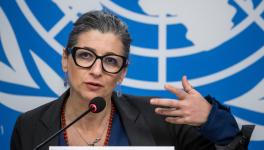Israeli-Palestinian Conflict: One State is the Solution
Professor Nadim Rouhana of Tufts University talks to Newsclick about the major points of disagreement that have emerged in the course of negotiations between Israel and Palestine. He says that the presence of Israeli forces in the Jordan Valley, the fact that Israel does not wish to part away with Jerusalem, the issue of Palestinian settlements on Israeli land and the identity of Israel as a Jewish state are the four main points of contention between the two countries. He characterizes Zionism as a form of colonialism and argues that legitimizing a Jewish state would amount to legitimizing colonialism and therefore denounces the two-state solution. He strongly criticizes the role of the US Government in furthering this exclusionary nationalism and says that the only solution is a one-state solution where Israelis and Palestinians live as equal citizens.

Transcript:
Prabir Purkayastha (PP): Hello and welcome to Newsclick. Today we have with us Professor Nadim Rouhana of Tufts University and we'll discuss the current negotiations that the Palestinians and the Israeli state are having particularly Mahmoud Abbas who seems to have made certain concessions regarding how NATO forces or even the US forces could be stationed in West Bank in order for the Israeli forces to withdraw. Now what are the major issues of the current negotiations and how do you see it panning out in the next few months?
Nadim Rouhana (NR): Right. Well there seems to be four major issues that emerged as the central issues of conflict in these negotiations. One of them is the presence of Israeli forces on the Jordan Valley that is the border between the future state, now the West Bank, and Jordan. The second is the Palestinian capital, Jerusalem, in the eastern part of Jerusalem which is now annexed to Israel. The third is how many settlements and how many settlers, how much territory Israel would keep in a future agreement and the fourth is the identity of the state of Israel as a Jewish state which Israel, as you know, has been recently demanding from the Palestinians to accept and recognise. Not Israel as such but Israel as a Jewish state or a state of the Jewish people. So actually on all these four issues my understanding and my sources tell me that there's no agreement between Israelis and the Palestinians or between the Palestinians and the Americans for that matter. On the particular issue of the forces on the Jordan Valley Abbas was arguing that if the issue is really security for Israel, well then perhaps that could be resolved by having other forces than Israeli forces. There's no need for Israeli forces to be there. There could be either NATO forces or American forces. The most recent proposal was to have some American forces there. That's on that issue. I don't think it's only the forces that's there. As you know there is a string of settlements across the Jordan Valley, very many Israeli settlements, and most of the land there is under Israeli control and actually some of the very interesting work that one UN agency is doing there shows that Israel has been deporting the Palestinians from that part into to other parts of the West Bank because it doesn't have in its future plan, leaving that part of the West Bank. One of Mr. Netanyahu's coalition partners called the “Jewish House”, HaBayit HaYehudi in Hebrew, that party openly argues for the annexation of that part of the West Bank into Israel because it has many settlements and doesn't have many Palestinians. So it doesn't threaten what is known in Israel as “the demographic threat” that is the Arab-Jewish composition of the population. On the other issues there is no real agreement. I can.. if you want I can talk about any of them.
PP: Coming to the fourth point that you mentioned- Israel as a Jewish state. Now the US Congress has also passed resolution saying precisely that, that the world should recognise, the Palestinians should recognise Israel as a Jewish state. The interesting part is this argument of an ethnic state is something that's really in common with, for instance, Nazi Germany or you have fundamentalist forces in different parts demanding that it should be Islamic state and of course you have also what are called Hindutva nationalists in India who also demand that India should be Hindu state. These are all exclusionary nationalism and we thought we had left it behind in the 20th century.
NR: Well you're absolutely right. I mean the definition of Zionism as exclusionary nationalism is the right definition of course with two additional elements. One of them is the religious element which is similar to the Hindutva Movement here and so it does make it a religious national movement and that particular segment of Zionism is increasing in power tremendously in recent years, but it's also a colonial movement, right. So the fact that the Western world, although not all of it, but to have the American President being a “black” president, American-African president, calling for the recognition of Israel or recognising Israel openly as a Jewish state and talking about that in the State of the Union Address last month, is quite disappointing to many people, to Palestinians and others who support the Palestinians and precisely from the point of view that you presented: that this is ethnic exclusionary nationalism and it's a recipe for continued conflict in the future. Palestinians will not accept that for many many many reasons. Palestinians will not accept that for three obvious reasons and there are others. One, and the most fundamental is that it negates history itself. This place is Palestine and it's for Palestinians and Palestinians existed there and the Zionist Movement came from overseas, occupied the place and established the state called Israel. Now to say that Israel is a Jewish state and recognise it as a legitimate state that means that you are legitimising colonialism as such. There's no nation on earth that will accept on itself to legitimise colonialism. Now Abbas knows that and there are many people.. even if he personally wants to do that there is so much resistance in the community that it would be very hard for him to accept it. Number two, think about the refugees who's goal is to return to their homes. So once Israel is recognised as the Jewish state so they will claim that okay, it's a Jewish state, the Palestinian refugees will have to find somewhere else, not necessarily the Jewish state. So it closes that fundamental issue of where the Palestinian cause started, right. Number three, think about it, it's between 16%-20%, depends how you count in Israel because Israel has different levels of citizenship so do you count the Palestinians in East Jerusalem for example or not among the Palestinians inside Israel, you have say about 20% citizens or residents who are not Jewish and to say that you're imposing on them a Jewish state that means you're imposing on them permanent inequality. The Israelis are very clear about that. They tell... and I happen to be a Palestinian from Haifa, that's the part of Palestine on which Israel was established. So for Israel to come and tell us, these Palestinians from there, that this is a Jewish state, the leaders also tell us that if you want to have any national aspirations here's the Palestinian state next door. Just pack and leave. So this is very dangerous on all these levels. I do not see how that will be accepted but at the same time I must tell you, it's really disappointing to see the West pushing in that direction. Not all, not all of them, I mean some are very careful but the United States leadership in particular, American President who knows about the suffering of his own community and others and the United States, a multi-ethnic, open democracy in which I, as a Palestinian, feel as part of the community. So I can't feel as part of the community, of the political community, in my own original homeland, Palestine, but I can feel that in that state of that president who's calling on us to accept Israel as Jewish state. This is remarkable actually.
PP: Re-establishment of legal, formal Apartheid if you accept it's a Jewish state because then automatically all non-Jews are different kinds of citizens. This is accepted in legal terms of the principle of Apartheid state.
NR: I would say whether it's Apartheid or not precisely, it's the same family of that political regime. If you think about the Israeli regime now and the West bank including the control of all of Palestine, in my mind it's worse than Apartheid because Apartheid did not ask the native population of South Africa to say this is not your homeland, this is the homeland of the 'whites'. Apartheid did have this governance of separation, right, the system of separation and superiority but it didn't clam that this land is the land of the 'whites'. So yo have a group coming and saying this land, including the West Bank, is the land of the Jews, of the Jewish people. So in that regard, that's on that level but also on the practical level of how the land is taken and how Palestinians and control and so on there are practices that are worse than Apartheid. Now if there's a two-state solution and the identity of the state as Jewish state is accepted, I think you're also right because these Palestinians like myself who.. of course I'm a professor at Tufts but also I have my strong connections and my family and my research and I go back and my home and so on, Palestinians like myself inside Israel will be discriminated against constitutionally with the approval, in a way, of the world and so I think you're right in that regard.
PP: The question of the two-state solution. Now it does appear that having Gaza under the Hamas , having the West bank, rest of it, under Fatah at the moment, it does appear that the Palestinian unity is broken (A) and (B) therefore there is no pressure really on Israel to settle even the occupation of West Bank. Do you think that actually a two-state solution under such conditions, where you've already talked about the settlers taking over more and more of the land, the Jordan valley that really completely on two sides encloses the West Bank, under such conditions do you think West Bank or a two-state solution is actually a viable Palestinian solution?
NR: I think it's increasingly less viable but not only because, or not mainly because of the Hamas controlling Gaza and the Palestinian authority under Fatah controlling the West Bank, because the working assumption among Palestinians is that the Palestinians can bring a good deal of two-state solution than they can bring Hamas along. Incidentally, it's ironic that the Americans on the one hand want the Palestinians to reach an agreement with Israel and they know that this agreement has to represent at least the Palestinians in the West Bank and Gaza, at the same time they are discouraging an internal agreement between the Palestinians in the West Bank and Gaza, between Hamas and Fatah. So it's very complicated game in which the authority is saying okay. Let's negotiate and Hamas is agreeing and let's see what you get. If you get a good deal we'll see what we do but the barrier to two-state solution is the agreement on these four issues that I mentioned and that it doesn't seem, for example, that the Israelis are willing to concede a Palestinian capital in Jerusalem and Palestinians see that that's sine qua non for an agreement, they can't go ahead with that without a capital in Jerusalem, and the settlements too. So the United States is really pushing, it's pushing very very hard to reach an agreement because that is within the American strategic plan, serves American interest for many reasons. This is not our issue now, we can talk about it if you want but anyway, they are pushing very hard but their pressure is asymmetric, in the sense that I mean we can't look at the United States as a neutral and uninterested mediator. So their main pressure is on the Palestinians although they have some pressure on Israel. They are putting some pressure on Netanyahu and Netanyahu is resisting and using all his allies in the United States, the Congress and the pro-Israel lobby and so on and the fundamental Christian Movement, but the main pressure is on the Palestinians on the four issues. Now think about what Palestinians would do if they accept the American pressure. We don't what we'll do, I don't think they will accept American pressure but on these issues if they accept it I think the question would be whether the Public will accept it. I don't think the Israelis will accept it. So the two-state solution is in trouble because of these, of the issues between Israelis and Palestinians mostly.
PP: So even more than the two issues of the Jewish state and the right to return and so on, the real.. also on the ground, well, Abbas will find it difficult to accept is that if the settlers stay , which is what Netanyahu is actually working for and East Jerusalem is not conceded and East Jerusalem is not just East Jerusalem, it's also so many other parts which have been annexed now which wasn't originally within East Jerusalem, so looking at that it would be a non-viable state in any case. If they accept or under American pressure a moth eaten West Bank as it were.
NR: You're right. I mean East Jerusalem is not East Jerusalem that it were, it changes by the day. The Judaisation of Jerusalem is a priority for the Israelis. If you visited there each year you will see changes so it's an issue. The settlements.. you know Netanyahu made a statement that is controversial and it's not exactly what he meant. He said that perhaps some settlers can stay in a future Palestinian state. He was criticised for that and he kind of withdrew that statement, no Israeli settlers can stay in the Palestinian state. The issue is not whether only settlers can stay in the Palestinian state. When we talk about the settlers and the settlements there are what's called the blocks of settlements which in Camp David, nobody knew the exact percentage in Camp David 2000, people were talking about 4-5% now it's more 10 or more %, of the land on which the settlements exist and if you look at Jerusalem that is the vast majority of East Jerusalem is now Jewish settlements. So these would be... and other parts of the West Bank and the heart of the West Bank would be annexed to Israel in return for territory to be negotiated and the percentage of the territory that Israel would concede to the Palestinians, where, the quality of the land and so on.
PP: Some dessert land...
NR: Some dessert land perhaps and the Naqab, what's called the Negev and so on. So it's really that and according to that plan it would be very hard for a viable Palestinian state to exist.
PP: What do you think is a long term strategy for the Palestinian people given that the current range of negotiations don't seem to be going anywhere, if these are the constraints?
NR: I'll tell you. I mean as a student of that particular conflict and more recently of colonialism I have been looking at.. if we agree that Zionism is a form, not only a form, is colonialism, it's a different kind of colonialism because Zionism did not have a motherland, right, but it is. These are people from the outside, who under whatever ideology and whatever story they told themselves, that came to this land, claimed it as their own, took it over, expelled the Palestinians and still practicing colonialism. If you look at the history of colonialism I didn't find, I mean I'm speaking in a TV interview so if somebody would prove me wrong let me know, settler colonialism, there's no case in history in which settler colonialism ended with partition. I mean people immediately tell me well how about Pakistan and India, this is not settler colonialism. It's a different kind of colonialism.
PP: It's a consequence of colonialism but not settler colonialism for sure.
NR: So settler colonialism ended either in one-state solution- the South African Model, the expulsion of the colonists- the Algerian Model or the elimination of the natives- the North American Model.
PP: Australian as well.
NR: Right. Australian or North American Model. I think the problem with Palestinians, that I was mentioning to you just before this interview, is that Palestinians always talked about colonialism, they left that paradigm in the 70s when the two-state solution emerged, but when they talked about colonialism, in my mind they adopted the wrong model. They adopted the Algerian Model and I think when Palestinians get convinced that it's the South African Model and approach the world and approach the colonisers themselves with that model as one state for equal citizenship for Israelis and Palestinians. Not for the Jewish people and Palestinians, for Israelis because there is a nation that's called Israel that was formed over the years whether Palestinians want it or not. So I think that's the future. The future is to work towards that vision of one state: multi-ethnic, multi-national, bi-national in this case, equality and citizenship as the anchor of belonging and the criterion of the major component of citizenship.
PP: Re-assertion of civic nationalism. That, not this distorted variety of exclusionary nationalism which Zionism really is.
NR: Yes. I think that's the way to put it. You know the pressure towards not only that exclusionary nationalism to win but also to be recognised and to be legitimised and to be accepted by its victims. I think this is a recipe for conflict and as you know I deal with conflict resolution as you asked me and as a student of conflict and conflict analysis I can say with certainty that it's a recipe for continued conflict. People will not accept to be less equal. There's no people, there's no nation on earth who would accept to be less equal because another nation says we are, for whatever reason on earth, more worthy than you are. So this is why I say it with so much certainty that it's a recipe for continued conflict. I think the world doesn't think that way. Policies and politics of the United States is not about that. It's the legacy of the president, it's about the internal dynamics of the relationship with Congress, it's about the next four years, the next turn's elections and so on. It's about maintaining the national interests of the United States in the big picture, the way they are perceived with the internal dynamics of pressure groups and so on. These are the... it's not about what's just and what's not just in the world and people in conflict think differently. Justice is a component we have to take into consideration.
PP: And hopefully the Boycott Divestment Sanctions Movement will gain more and more traction and hopefully the internal politics of the United States and other Western countries, who are backing the Israeli Jewish state formula, will have to rethink on it but that's something which is more long term that we have to see. Thank you very much Professor Rouhana. It's been a pleasure talking to you and hope to see you again in India.
NR: Thank you very much. It's my pleasure.
Get the latest reports & analysis with people's perspective on Protests, movements & deep analytical videos, discussions of the current affairs in your Telegram app. Subscribe to NewsClick's Telegram channel & get Real-Time updates on stories, as they get published on our website.






















